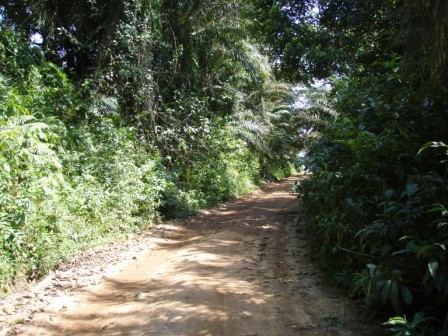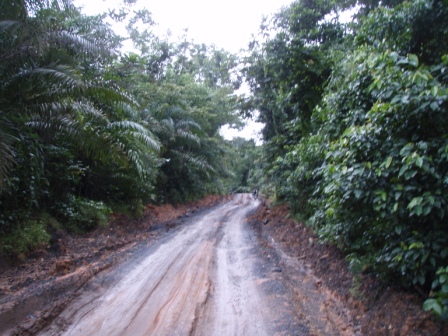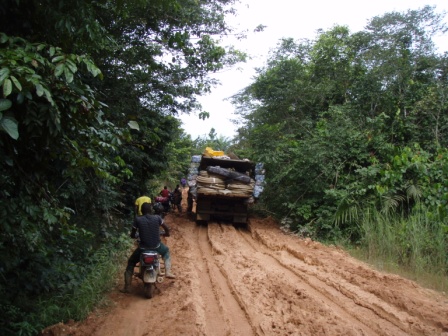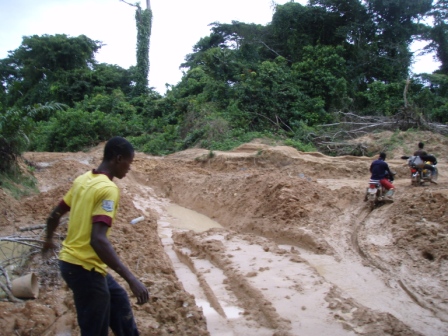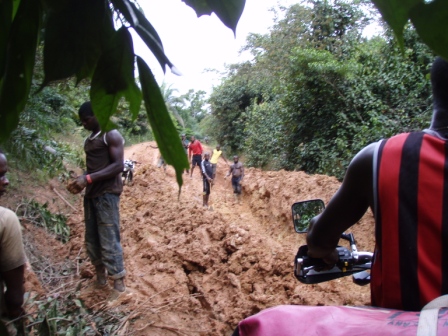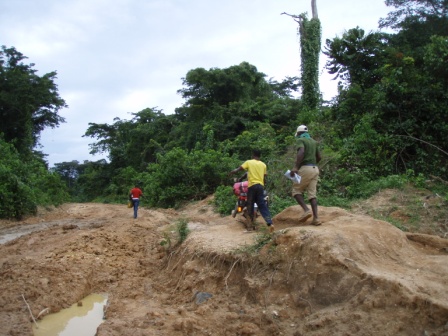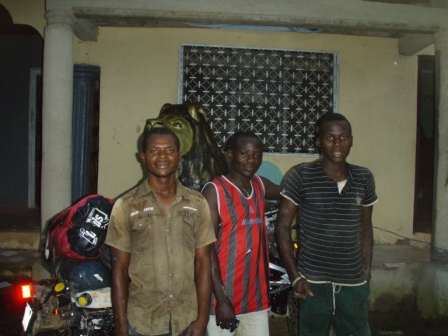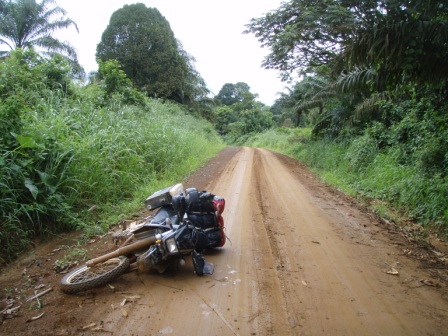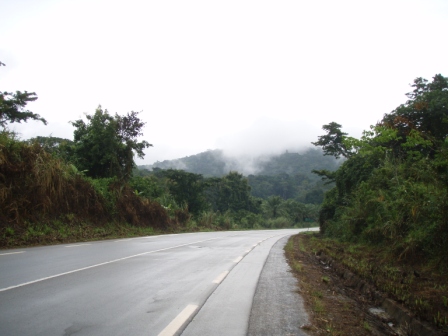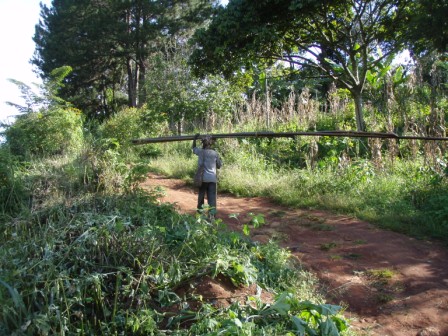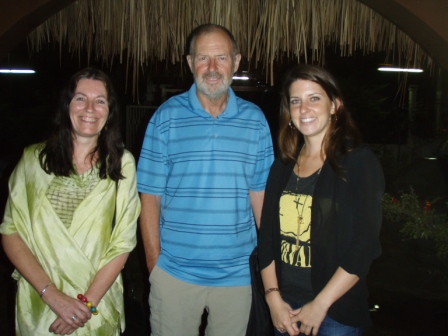Cameroon
I awoke the Monday morning at the Ogoja Hotel to a major rainfall. It got me thinking that I was at a crossroads of sort. I could end the trip here or take the plunge and continue on to Cameroon and be committed to the roads Lonely Planet describes as being only for the hardcore. Once I left Nigeria I would not be able to return unless I applied from Canada for a new visa. Nigerian tourist visas are single entry only. I enjoyed Nigeria for the most part and the thoughts of spending a few days in nearby Calabar (the nicest city in Nigeria) was tempting while I sorted shipping the bike back home from a major airline hub like Lagos (which also operates in English).
If go to Cameroon, then I pretty much have to go to Kinshasa, DRC for manageable air freight according to my research. Thats a lot of bad roads. I am getting a little tired of the so-called good roads with all the potholes and washouts and construction but then why did I come to West Africa if I was expecting good roads all the time? These were the contradictory thoughts dancing through my helmet as I got closer and closer to the Cameroon border at Ekok along the same road that leads to Calabar. Well, I could look to my left and see the gorgeous rainforest covered hills of Cameroon, the sun was now shining and why did I work so hard to get here and not experience the heart of darkness Africa. So across the border I went.
I knew the upcoming border short section of road (85km) was notorious for being impassable after big rainfalls so I asked every official on both sides of the border about the condition of the road. All answers were similar; Well, there are a few bad spots in the first few kilometres but with that bike you can get through OK.
Manfe Road
As I headed down the dirt road it was rough but I soon passed a settlement where some motoboys called out to me. They said you cannot get through the bad sections by yourself, you will need some pushers. OK, how much? We want 10,000CFA each. They seemed sincere so I offered 5,000CFA. They declined but advised me to follow the tracks used by the motoboys. Now I was starting to get worried. A few kilometres later there were some deeply rutted sections but I was able get through.
I soon learned a couple of things about the red dirt. A laterite road when damp becomes a kind of sticky clay that in a contradictory way can provide a lot grip if it is not too wet but then is too thick for the bike to push through a track. When I needed to I couldnt get the back wheel to break loose and spin. It just gripped forcing me to slip the clutch to get moving. Giving lots of power and fully releasing the clutch would just stall the engine. I needed a much lower 1st gear ratio for this stuff.
I arrived at a huge hole in the road that had a fairly large overloaded truck stuck deep down in it. There was a crew busy digging the hole even deeper so the truck could free itself (which of course is why the hole gets even deeper for the next vehicle).
There were a number of motoboys on their tough little 125cc Chinese bikes waiting to get by. I assumed that they provide a taxi and freight service to the villages along the road. They travel together too in order to push each others bikes through the rough spots. I was now struggling. My tires, nice grippy TKCs are about twice as wide as the motoboys bikes so in following their trail I was pushing through a lot of the sticky mud. Also my side cases were catching on the sides of the ruts. These tough sections were pretty consistently about 100 meters apart. After a few kilometres of this in the 33C heat and I was exhausted and I was worried about the abuse the clutch was taking. By now the motoboys had included me in their collective pushing group (calling me Papa) but Im more of a liability than an asset. I finally had to tell them I ccouldnt continue. I needed to rest. Being clever industrious lads they make an offer that I dont want to refuse. For some compensation (5000CFA) each they will get me and the bike past the nasty sections (to just the poor sections) and I will be good to go. With little choice I swallow my pride and let one guy ride my bike and I follow as a passenger on another. It works well, the young man loves the bike and can ride circles around me on this road that he knows so well. Being a passenger was a little hair-raising at times and we had a few very muddy spills but with a little more pushing we all made it to a town. We stopped here mainly because it had started to rain pretty hard. The clutch on the Suzuki was now slipping badly.
That night in the little hotel I pondered how I can get parts for the clutch or even get the bike to Manfe (60km away) where I could pull the clutch and see the disc condition. I was also feeling strangely good about the day. It was challenging to say the least and we had endured and that was satisfying. In the morning I found the wear on the clutch and a displaced clutch lever due to the falls had taken up all the cable free play. By using up all the adjustment available I was able to get the clutch to fully engage. So with that problem sorted albeit temporarily, I headed to Manfe.
The road proved only slightly better with a new twist. In the wet hard-packed sections it was deceptively slippery. It looked OK until my rear wheel just gently started slipping sideways until I was sliding backwards down the road. It reminded me of the invisible black ice we can get on the roads in Canada. So thats why the motoboys put both feet down when going through this stuff! I could also see that the Chinese contractors were building a totally new road but it will still be a few years away. They can only work during the shorter dry season.
From Manfe the road to Bamenda was brand new excellent tarmac winding through the mountainous region but strangely empty. I had read to beware of empty roads because it usually meant a closure further ahead. Sure enough a landslide covered the road but there was a diversion but only for two-wheelers. I was glad to follow a guy who obviously new the trail which included a rocky stretch up a mountain stream!
Arriving in Bamenda about 3:00PM after only 150 km, I found a hotel and got organized to clean and service the mud-packed bike, to get my phone activated and to change some money. All this was accomplished by noon the next day and I was off to Yaounde. I was in Bafoussam by late afternoon for the night. The ride through the low mountains was fun but the dreaded pot-holes kept progress slow as usual. The rain was almost a constant now with breaks of blistering hot sunshine. I prefer the rain.
An early wet start the next morning and I managed the 324km to Yaounde by 1:00pm with better roads with the only delay a wait for the annual Chantel Biya cycling race to pass. Watching the chaotic driving by the support vehicles and police escorts was better than the race itself.
I went straight to the Gabon Embassy and completed the visa application (70,000CFA) for fast next day service. Finding a reasonably priced hotel was more of a task and I ended up in Clamantis Hotel on the Nlongkak roundabout. Pricey at 25,000CFA but very nice and with wifi access. The rain late afternoon rain arrived just as I had unloaded the bike.
View from my hotel, Yaounde
.jpg)
As I write this, there is no water (a bucket of water was supplied) but the promise of a hot shower vanishing was disappointing. Also the internet worked for a few hours but is now mysteriously unavailable. The hotel staff seem to think this is a normal situation and dont get that guest might resent paying for services not delivered. Why do I expect things to work here as they do in North America (as if there are not plenty of screw-ups there)? I wanted to use this time to research my next steps and need the internet so I hope it is back soon.
Both water and the internet appeared the next morning, a Friday. I fired off some e-mails to get an idea what my options were in shipping the bike home from various countries. I also made contact with two Canadian CUSO/VSO International volunteers who were working in Cameroon and we had a nice dinner that evening. It was interesting to hear about their work in Cameroon (both were on 2 year assignments) and I admire their dedication to their work. Of course it was good to have relaxed conversation with fellow Canadians.
Watching the rain outside my window early the next morning made it easy for me to take a couple of days off, catch up with the laundry, etc and just rest. The very French Boulangerie across the street was a constant temptation to which I had no resistance.
Well fed, I was anxious to leave Monday and got off to an early start with my rain gear on as a heavy misty rain fell. An hour later the sun came out and it became easy to spot the water-filled potholes as they reflected the light. I reached the border after the many road blocks by various agencies for document checks. The process repeated itself on the Gabonese side with passport and travel information laboriously recorded in large ledgers by hand while you wait in the heat.

